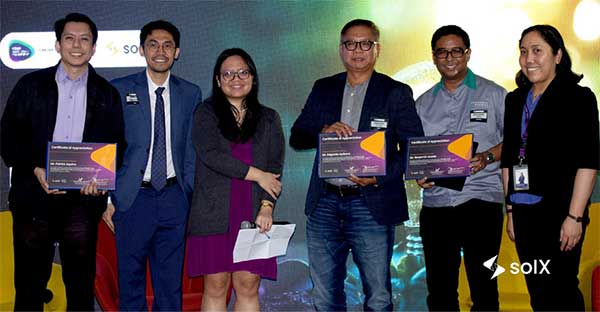
Energy leaders and industry stakeholders gathered this week to tackle the Philippines’ persistent energy challenges, emphasizing regulatory reform, efficiency, and the advancement of retail competition and open access (RCOA) in a masterclass organized by SolX Technologies and the Asian Institute of Management (AIM).
The event, titled “Strategic Energy Management: Unlocking Savings & Sustainability for Industries,” brought together representatives from the Department of Energy (DOE), the Energy Regulatory Commission (ERC), and private sector leaders.
Carlos Lorenzo Vega, President and COO of First Gen Energy Solutions, underscored the urgency of addressing the country’s Energy Trilemma—ensuring energy security, affordability, and sustainability—as the sector struggles to evolve despite legislative reforms.
“Twenty-four years after EPIRA and 17 years since the Renewable Energy Act, we still face the same dilemmas—rising demand, grid vulnerabilities, and a growing dependence on fossil fuels,” Vega said.
Citing historical data, Vega pointed out that coal’s share in electricity generation has ballooned from 7 percent to 62 percent, contrary to the goals of the Renewable Energy Act of 2008.
“The RE Act was meant to accelerate renewable energy adoption, yet our grid remains vulnerable and reliance on fossil fuels continues to rise,” Vega added.
While the number of Retail Electricity Suppliers (RES) has grown from 18 in 2013 to 55 in 2025, Vega noted that supply-side development has lagged behind, failing to keep up with increased demand from industrial and commercial sectors.
“The prices we see today reflect the delay in regulatory execution and market competitiveness,” he said.
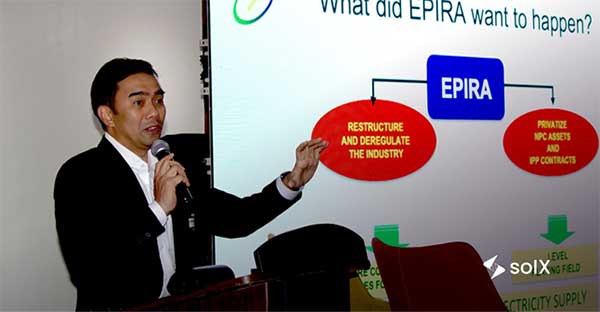
He urged immediate investment in renewable energy and grid modernization, warning that without these actions, the country risks supply shortages that could stifle industrial growth and economic stability. He called for cost-reflective pricing mechanisms, stronger regulatory execution, and incentives for renewable projects to ensure a more resilient energy market.
Panel Discussion: The Future of RCOA and Retail Aggregation
The expert presentation on EPIRA set the stage for a pivotal panel on the Retail Competition and Open Access Act (RCOA), a key reform provision. The discussion brought together thought leaders from the ERC, Retail Electricity Suppliers, consumers, and SolX Technologies.
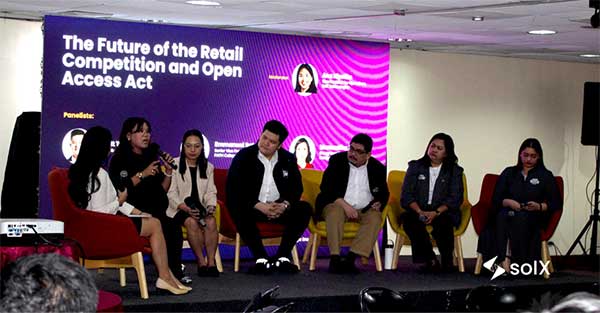
The panel explored the latest developments in the RCOA framework and its far-reaching impact, highlighted in the 2024 Retail Market Assessment Report. The report noted a 14% difference between retail generation rates and distribution utility rates, resulting in PHP 16.76 billion in savings. Additionally, a 12% increase in eligible contestable customers—now 59% registered—and an 80% surge in participation in the Green Energy Option Program (GEOP) point to a growing demand for competitive, sustainable energy choices.
Matt Levin Tan, COO of SolX Technologies, emphasized, “RCOA is a game-changer—it empowers businesses to control energy sourcing, cutting costs and enhancing market competition.”
Real-World Impact: FAITH Colleges’ Journey
Emmanuel Sator shared FAITH Colleges’ experience transitioning from the captive market to the contestable market: “As an educational institution, energy is not our core expertise. SolX Technologies was instrumental in supporting our shift to a new energy supplier, even post-pandemic. Their guidance gave us confidence to transition to the GEOP.”
Innovations in RCOA
Energy Regulatory Officers Maranatha Estalilla and Katerielle Cedeno highlighted key developments in the omnibus rules for the retail market program, issued on September 6, 2024, which streamlined rules and addressed policy gaps. The Retail Aggregation Program (RAP) was introduced, allowing end-users, small businesses, and even village residents to aggregate their demand and meet the 500 kW threshold for participation in the Competitive Retail Electricity Market (CREM).
Engr. Sheila C. Mina of ACEN and Engr. Jacqueline M. Castillo of Mabuhay Energy, both representing the Retail Electricity Sector, welcomed the RAP for making RCOA more accessible. However, they also emphasized the importance of scaling to meet market demand, setting the stage for further innovations in the sector.
Matt Levin Tan reinforced SolX’s commitment to technology solutions on both the supply and end-user sides. “Our job is to provide our clients with the right options and technology, helping them navigate the complexities of the energy market. For RES, we’re not competing against them—we’re helping grow the market by encouraging more businesses to embrace these options and contracts. As regulations evolve, we all win as a country,” Tan said.
Driving Sustainability: Energy Efficiency as a Competitive Advantage
The final segment of the masterclass focused on the critical role of energy efficiency in reducing costs and enhancing long-term sustainability. The panel explored the impact of the Energy Efficiency and Conservation (EEC) Act, best practices for compliance, and how businesses can leverage energy efficiency for competitive advantage.
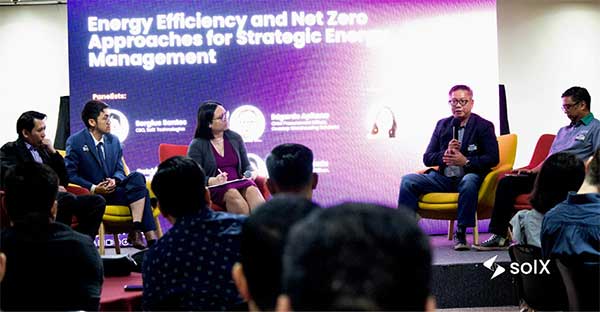
Director Patrick T. Aquino stressed the importance of energy audits: “Submitting an energy audit is mandatory. You cannot target what you don’t measure. Industry figures show that implementing energy efficiency will lower costs.” He noted the growing adoption of compliance, with over 7,000 companies now on board, compared to 1,300 in the first year.
Benjamin Azada, Chief Sustainability Officer at Converge, shared his company’s environmental progress: “We’ve cut emissions intensity by nearly 40% by replacing outdated technology.” He also credited SolX Technologies for optimizing efficiency in Converge’s data centers: “SolX helped us with our renewable energy transition.”
Edgardo Apitana, Chief Procurement Officer at Onestop Warehousing Solutions Inc of the Magsaysay Group noted how critical energy efficiency is to their competitive advantage as a cold storage business and cited its partnership with SolX in refining their approach.
Sergius Angelo Santos, CEO of SolX Technologies, emphasized the company’s role in driving industry-wide change: “One key solution we’re championing is guiding our 130+ clients through RA11285, providing audits and reports, while supporting the DOE in raising energy efficiency awareness and inspiring others to adopt sustainable practices.”
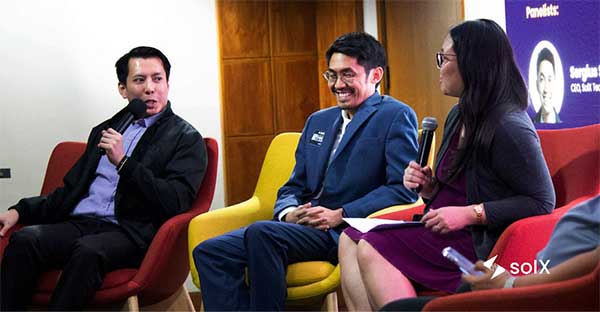
As the energy landscape evolves, it’s clear that a balanced approach is essential— embracing both renewable energy and energy efficiency. Director Patrick Aquino’s words, “You cannot RE your way to sustainability. RE alone does not solve sustainability, energy efficiency is not sexy but it is necessary,” perfectly encapsulated the event’s message.
As AIM Program Director Dr. Chad Michael Briggs highlighted in his welcome remarks, close collaboration with the industry creates progress in key issues. The masterclass underscored RCOA’s role in promoting market competition and providing businesses with more energy choices, while also emphasizing energy efficiency as a powerful tool for sustainability and cost savings. SolX Technologies continues to lead the charge in guiding industries through these transitions, offering tailored solutions that help businesses reduce costs, meet regulatory goals, and achieve sustainable growth across the Philippines. With a steadfast commitment to empowering the country’s energy future, SolX Technologies is paving the way for a resilient and efficient energy landscape.


















